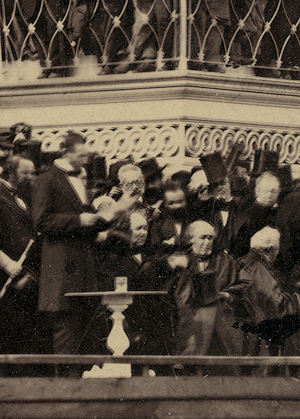

|
In November 1864, Abraham Lincoln was re-elected as president upon receiving 55 percent of the popular vote. By now, the Civil War had been raging for four years, with a death toll already surpassing half-a-million men from both sides. But with Union forces presently deep inside Southern territory, it was clear the Confederacy's days were numbered. On March 4th, 1865, the inaugural ceremony took place at the Capitol building in Washington, D.C. Interestingly, as Lincoln stepped up to the podium to deliver this speech, the wet and windy weather that had drenched everyone in attendance thus far, suddenly subsided and the sun appeared. In this brief speech, the President offers a philosophical and deeply religious reflection on all that has transpired, without assessing blame, and concludes with one of the finest speech endings yet heard. |
|
![]()
Fellow Countrymen:
At this second appearing to take the oath of the presidential office there is less occasion for an extended address than there was at the first. Then a statement, somewhat in detail, of a course to be pursued seemed fitting and proper. Now, at the expiration of four years, during which public declarations have been constantly called forth on every point and phase of the great contest which still absorbs the attention and engrosses the energies of the nation, little that is new could be presented. The progress of our arms, upon which all else chiefly depends, is as well known to the public as to myself, and it is, I trust, reasonably satisfactory and encouraging to all. With high hope for the future, no prediction in regard to it is ventured.
On the occasion corresponding to this four years ago all thoughts were anxiously directed to an impending civil war. All dreaded it; all sought to avert it. While the inaugural address was being delivered from this place, devoted altogether to saving the Union without war, insurgent agents were in the city seeking to destroy it without war - seeking to dissolve the Union and divide effects by negotiation. Both parties deprecated war, but one of them would make war rather than let the nation survive, and the other would accept war rather than let it perish, and the war came.
One-eighth of the whole population were colored slaves, not distributed generally over the Union, but localized in the southern part of it. These slaves constituted a peculiar and powerful interest. All knew that this interest was somehow the cause of war. To strengthen, perpetuate, and extend this interest was the object for which the insurgents would rend the Union even by war, while the Government claimed no right to do more than to restrict the territorial enlargement of it. Neither party expected for the war the magnitude or the duration which it has already attained.
Neither anticipated that the cause of the conflict might cease with or even before the conflict itself should cease. Each looked for an easier triumph, and a result less fundamental and astounding. Both read the same Bible and pray to the same God, and each invokes His aid against the other. It may seem strange that any men should dare to ask a just God's assistance in wringing their bread from the sweat of other men's faces, but let us judge not, that we be not judged. The prayers of both could not be answered. That of neither has been answered fully. The Almighty has His own purposes. "Woe unto the world because of offenses; for it must needs be that offenses come, but woe to that man by whom the offense cometh." If we shall suppose that American slavery is one of those offenses which, in the providence of God, must needs come, but which, having continued through His appointed time, He now wills to remove, and that He gives to both North and South this terrible war as the woe due to those by whom the offense came, shall we discern therein any departure from those divine attributes which the believers in a living God always ascribe to Him? Fondly do we hope, fervently do we pray, that this mighty scourge of war may speedily pass away. Yet, if God wills that it continue until all the wealth piled by the bondsman's two hundred and fifty years of unrequited toil shall be sunk, and until every drop of blood drawn with the lash shall be paid by another drawn with the sword, as was said three thousand years ago, so still it must be said "the judgments of the Lord are true and righteous altogether."
With malice toward none, with charity for all, with firmness in the right as God gives us to see the right, let us strive on to finish the work we are in, to bind up the nation's wounds, to care for him who shall have borne the battle and for his widow and his orphan, to do all which may achieve and cherish a just and lasting peace among ourselves and with all nations.
President Abraham Lincoln - March 4, 1865
![]()
The History Place - Great Speeches Collection
See also: The History Place - Abraham Lincoln Timeline
The History Place - YouTube Channel
[ The History Place Main Page | American Revolution | American Civil War | Child Labor in America 1908-1912 | U.S. in World War II in the Pacific | John F. Kennedy Photo History | Vietnam War | First World War | The Rise of Adolf Hitler | Triumph of Hitler | Defeat of Hitler | Hitler Youth | World War II in Europe | Holocaust Timeline | 20th Century Genocide | Irish Potato Famine | This Month in History | Books on Hitler's Germany | History Videos | Hollywood's Best History Movies ]
Terms of use: Private home/school non-commercial, non-Internet re-usage only is allowed of any text, graphics, photos, audio clips, other electronic files or materials from The History Place.
